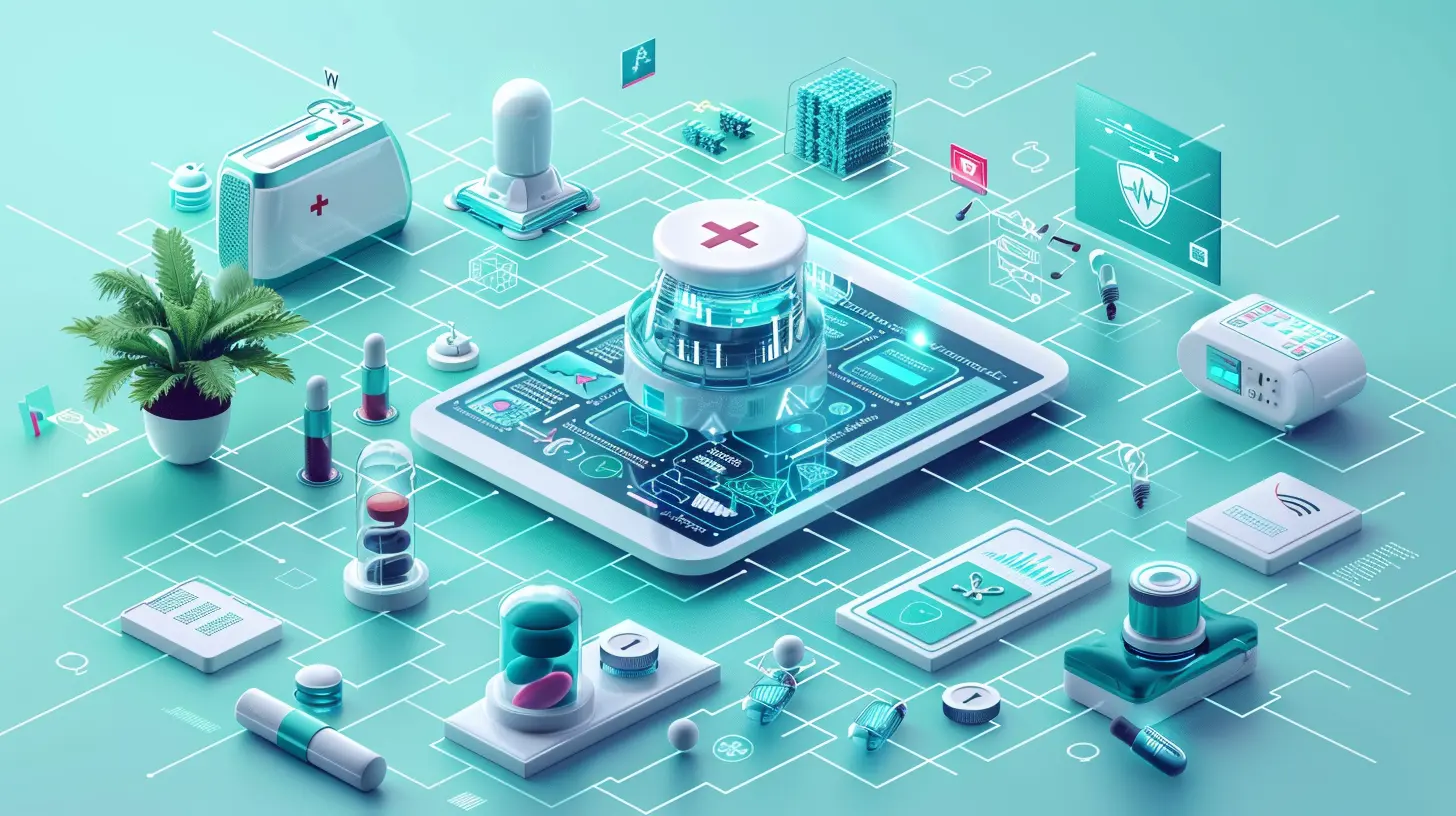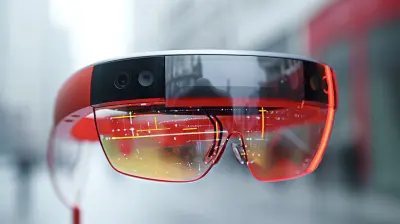How Tech Startups Are Revolutionizing the Healthcare Industry
2 October 2025
The healthcare industry has always been a field of innovation, but in recent years, tech startups have been shaking things up like never before. From AI-powered diagnostics to blockchain-based patient records, these nimble disruptors are changing the game.
But what exactly are they doing differently? And how is this wave of technology-driven change benefiting patients, doctors, and even healthcare systems as a whole? Let’s dive in and take a closer look! 
🚀 The Healthcare Revolution: Why Now?
Healthcare is one of those sectors that’s traditionally slow to adopt new technology. Why? Because it’s highly regulated, complex, and—let’s be real—getting doctors to change the way they do things isn’t easy.But a few key factors have created a perfect storm for innovation:
- Rising Costs – Healthcare is expensive, and inefficiencies drive prices even higher. Technology offers ways to cut costs without cutting corners.
- Demand for Accessibility – More people want healthcare solutions at their fingertips, not just in hospitals or clinics.
- Data Explosion – With electronic health records, wearable devices, and AI algorithms, we have more healthcare data than ever. The trick is using it effectively.
- Pandemic-Driven Change – COVID-19 forced the industry to embrace telemedicine and digital solutions almost overnight.
Tech startups saw these gaps and jumped in with solutions that are not just innovative but game-changing. 
🏥 How Startups Are Disrupting Healthcare
Let’s break down exactly how these startups are making waves in different areas of healthcare.1. AI-Powered Diagnostics: The Doctor’s New Best Friend
Imagine walking into a clinic, getting a scan, and receiving a near-instant diagnosis. That’s not science fiction—it’s happening right now!Artificial intelligence is being used to:
- Analyze medical images (X-rays, MRIs) faster than human doctors.
- Detect diseases like cancer earlier and more accurately.
- Predict patient deterioration before it happens, allowing for early intervention.
Example: Google’s DeepMind has developed an AI that can diagnose eye diseases with the accuracy of a top ophthalmologist. Pretty wild, right?
AI doesn’t replace doctors; it makes them better by providing supercharged insights in seconds.
2. Telemedicine: Healthcare Without Borders
A few years ago, the idea of seeing a doctor over video call sounded like a last resort. Now? It’s becoming the preferred method for millions.Tech startups have built platforms that:
- Allow patients to consult doctors remotely.
- Provide prescriptions without in-person visits.
- Reduce wait times and increase efficiency.
Case in Point: Companies like Teladoc Health and Amwell have skyrocketed in popularity, proving that virtual healthcare isn’t just convenient—it’s essential.
The best part? It makes healthcare accessible for people in remote areas who might otherwise struggle to see a doctor.
3. Wearable Health Tech: Your Personal Health Assistant
Fitbits and Apple Watches are more than just fancy accessories. They’re mini health monitors tracking everything from heart rate to oxygen levels.Startups are taking this a step further, developing wearables that:
- Detect irregular heart rhythms (potentially preventing strokes).
- Track glucose levels for diabetics without painful finger pricks.
- Monitor stress levels and recommend relaxation techniques.
With real-time health monitoring, people can catch issues before they become serious—and that’s a game-changer.
4. Personalized Medicine: No More One-Size-Fits-All Treatment
Traditional medicine often follows a "one-size-fits-all" approach. But let’s be honest—what works for one person doesn't always work for another.Thanks to big data and AI, startups are working on personalized treatments based on:
- Genetics – Tailoring medications to an individual’s DNA.
- Lifestyle Data – Factoring in daily habits, diet, and activity levels.
- Predictive Analytics – Identifying risks before symptoms even appear.
Companies like 23andMe and Veritas Genetics are already offering genetic testing that helps people understand their health risks better.
Imagine a future where your medicines and treatments are designed just for you. That future is closer than you think!
5. Blockchain in Healthcare: Say Goodbye to Data Breaches
Patient data is incredibly sensitive, but current systems are often outdated, vulnerable to hacks, and—let’s be real—a nightmare to navigate.Startups leveraging blockchain technology are fixing this by:
- Providing Secure, Decentralized Medical Records – Patients have full control over who accesses their health data.
- Ensuring Data Integrity – No more lost or altered records.
- Making Record Transfers Seamless – Eliminating the hassle of paperwork when switching providers.
Now, instead of hospitals struggling to share patient information, blockchain makes it secure and instant.
6. Robotics in Surgery: Precision at a Whole New Level
Surgical robots sound like sci-fi, but they’re already assisting doctors in performing incredibly complex procedures with unmatched precision.How? By reducing human error and allowing for minimally invasive surgeries, leading to:
- Faster recoveries.
- Less scarring.
- Reduced risk of complications.
Startups like Intuitive Surgical (maker of the famous da Vinci Surgical System) are leading the way, changing how surgeries are performed forever. 
💡 Challenges: Not All Smooth Sailing
Of course, with great innovation comes great challenges. Some hurdles tech startups in healthcare face include:✔ Regulatory Barriers – Healthcare is one of the most tightly regulated industries, and getting approvals is no walk in the park.
✔ Data Privacy Concerns – Handling sensitive patient information comes with serious responsibilities (and risks).
✔ Adoption Resistance – Some doctors and hospitals are slow to embrace new technology, either due to skepticism or outdated systems.
But despite these challenges, the momentum is undeniable. 
🚀 The Future of Healthcare Tech
So, what’s next? If the rapid advancements we’re seeing are any indication, the future of healthcare could look something like this:- AI doctors handling routine cases 24/7.
- More at-home diagnostics, reducing the need for hospital visits.
- Breakthroughs in gene editing, potentially curing hereditary diseases.
It’s an exciting time, and startups are at the heart of it all.
🎯 Final Thoughts
Tech startups are revolutionizing the healthcare industry—not just with cool gadgets but with real-world solutions that save lives, cut costs, and make healthcare more accessible.Sure, challenges exist. But with innovation happening at lightning speed, the future of healthcare is looking brighter than ever.
Will traditional healthcare fully embrace this wave of change? Only time will tell. But one thing’s for sure—there’s no turning back now!
all images in this post were generated using AI tools
Category:
Tech StartupsAuthor:

Michael Robinson
Discussion
rate this article
1 comments
Lulu Roberson
This article beautifully highlights the innovative spirit of tech startups. It's inspiring to see how they are making a real difference in healthcare!
October 4, 2025 at 11:35 AM

Michael Robinson
Thank you! I'm glad you found the article inspiring—tech startups truly are transforming healthcare in remarkable ways.


